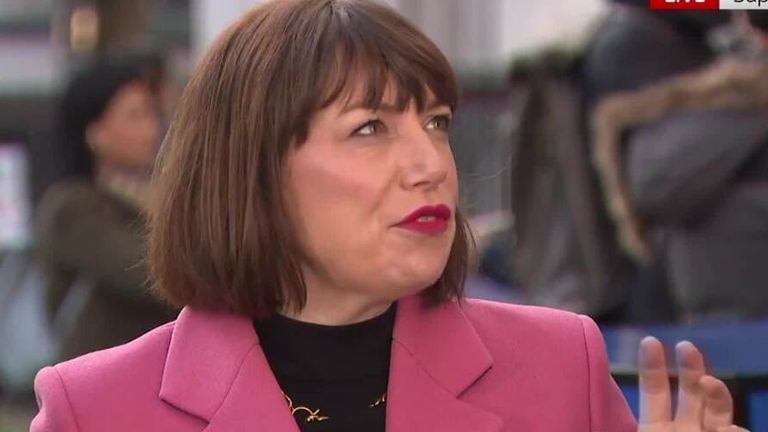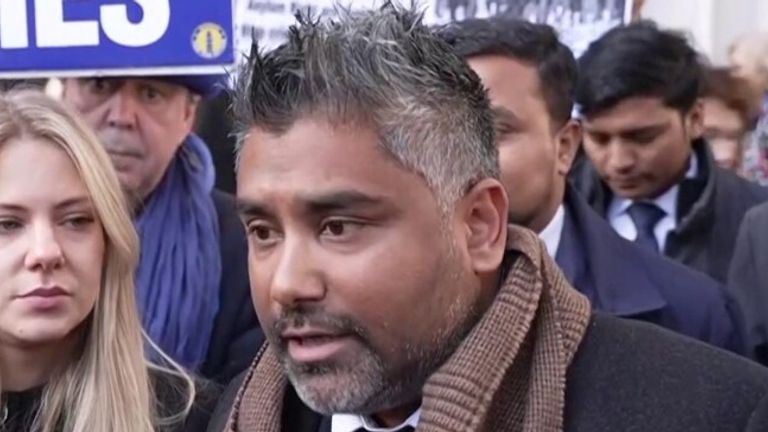
The government’s Rwanda plan, devised to tackle illegal migration, has been dismissed by the Supreme Court, ending over 18 months of legal battles in the UK.
Lord Reed announced the “unanimous” judgment from the court’s justices on Wednesday, saying those sent to the country would be at “real risk” of being returned home, whether their grounds to claim asylum were justified or not – breaching international law.
Politics live: PM ‘prepared to change law’ – and will hold news conference today
While charities celebrated the decision as “a victory for humanity”, Rishi Sunak said the judgment was “not the outcome we wanted”.
But he appeared to double down on the policy, telling the Commons he was “prepared to change laws and revisit… international relationships” if they were “frustrating” his plans.
The new Home Secretary James Cleverly announced the government planned to change its agreement with Rwanda into a treaty, with extra clauses to stop asylum seekers from being returned home, in the hope of settling the court’s concerns.
However, shadow home secretary Yvette Cooper accused the government of “more of the magical thinking”.
Mr Sunak will hold a press conference at 4.45pm where he is sure to face questions on both the ruling and his future plans, as well as brewing anger on his backbenches over the impact of international human rights laws on his policies.
The Rwanda scheme, which would see those arriving in the UK illegally – including via small boats – deported to the east African nation, was first put forward by Boris Johnson in April 2022.
Successive prime ministers all claimed the policy would act as a deterrent to those seeking to cross the Channel, as well as help to break up people-smuggling gangs.
But critics consistently called the proposal “inhumane”, and the plan was dubbed a “gimmick” by political opponents.
An injunction from the European Court of Human Rights stopped the first flight to Rwanda from taking off in June last year and the scheme has been embroiled in litigation ever since, meaning no asylum seekers have yet been deported to the country.
Explainer: Everything you need to know about the Rwanda plan
Delivering the Supreme Court’s ruling on Wednesday, Lord Reed said there were “serious and systematic defects in Rwanda’s procedures and institutions for processing asylum claims”, including a “lack of legal representation” and risks that judges and lawyers “will not act independently of the government”.
The justice also said there was a “surprisingly high rate of rejection of asylum claims from certain countries in known conflict zones”, including Syria and Yemen, which many people coming to the UK may originate from.
He pointed to an “apparent inadequacy of the Rwandan government’s understanding of the requirements of the Refugee Convention”, specifically that under the United Nations agreement, asylum seekers had to be protected from “refoulement” – being sent back to their country of origin – and there was evidence the country had failed to comply with this when it signed a similar deal with Israel.
And while he accepted the deal had been “entered into… in good faith”, the evidence showed “there is a real risk that asylum claims will not be determined properly, and that asylum seekers will therefore be at risk of being returned directly or indirectly to their country of origin”.
Lord Reed said changes to eliminate that risk “may be delivered in the future”, and he underlined that the Supreme Court’s decision was a “legal question” based on international law – including the European Convention on Human Rights and various UN treaties – with the court “not concerned with the political debate” about the scheme.
After the ruling, Mr Sunak pointed to what he saw as the positives – namely that the court “confirmed that the principle of sending illegal migrants to a safe third country for processing is lawful”.
Speaking at Prime Minister’s Questions, he sought to reassure his own MPs that he remained committed to the Rwanda plan, telling them: “The government has already been working in advance on a new treaty with Rwanda which we will finalise in light of today’s judgment to address the challenges that were raised.
“But let me say this again, if it becomes clear that our domestic legal frameworks or international conventions are still frustrating plans at that point, I am prepared to change laws and revisit those international relationships.
“The British people expect us to do whatever it takes to stop the boats and that is precisely what this government will deliver.
But Labour leader Sir Keir Starmer pointed to the prime minister’s pledge in January that he would “stop the boats” by the end of the year, adding: “He has wasted all of his time on a gimmick and now he is absolutely nowhere.
“[He needs to] level with the British public and finally admit he’s failed to deliver on his promise.”
The ruling is now likely to reignite a row in the Conservatives over the UK’s future as a signatory of international human rights agreements – something the now ex-home secretary Suella Braverman has railed against.
MPs on the right of the party have been calling on the UK to exit or attempt to work around the European Human Rights Convention (EHRC), arguing the final say on government policy should be made in the British parliament rather than abroad.
One faction, called the New Conservatives, have been meeting this morning to discuss their next steps, and the party’s deputy chairman, Lee Anderson, said ministers should “ignore the law” and start sending asylum seekers to Rwanda anyway.
In her blistering letter to Mr Sunak after she was sacked earlier this week, Ms Braverman pre-emptively pinned the blame on the prime minister for the immigration policy she was charged with implementing falling in the courts, accusing him of not having a “plan B” to push forward.
Tweeting after the ruling, the former minister called for “emergency legislation” to “block” legal challenges, saying it would “give parliament a clear choice – control illegal migration or explain to the British people why they should accept ever greater numbers of illegal arrivals settling here”.
However, many in the party believe it is right to remain part of the agreements that protect human rights, standing alongside international allies.
Meanwhile, refugee charities celebrated the ruling, with the CEO of the Refugee Council, Enver Solomon, calling it “a victory for the rights of men, women and children who simply want to be safe”.
The chief executive of ActionAid UK also said the court’s decision came as a “huge sigh of relief”, as well as a vindication of “British values of compassion and dignity”.
And CEO of charity Choose Love, Josie Naughton, added: “Today’s decision is a moment of moral accountability.
“It shows the government cannot shirk its international obligations. Britain has a duty and legal responsibility to offer protection to refugees.”














